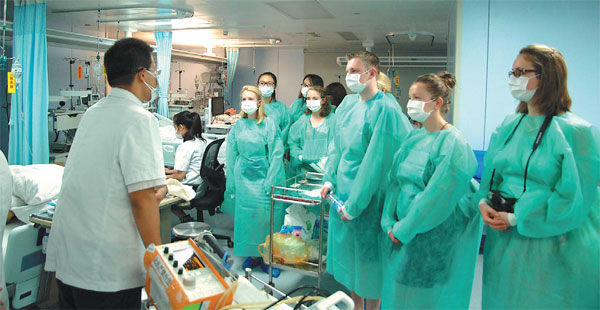China, UK ties are healthy ones
British experts help boost medical service as opportunity for mutual cooperation
The United Kingdom aims to forge healthy ties with China - literally - by frequently sending high-level medical delegations eastward for collaboration.
The most recent group traveled to Guangzhou, Beijing and Fujian from Feb 13 to Feb 17, led by Alok Sharma, the minister in charge of the Asia and Pacific department at the UK's Foreign and Commonwealth Office.
The UK is said to be in a golden era of cooperation with China, and collaboration in the healthcare sector is important to further expanding the depth and the breadth of the relationship, Sharma says.
|
Medical students of an exchange seminar from University of Glasgow visit First Affiliated Hospital of Sun Yat-sen University's ICU in Guangzhou. Provided to China Daily |
The trip began with a visit to the First Affiliated Hospital of Sun Yat-sen University, in Guangzhou, Guangdong province. The top-notch hospital in South China impressed the UK delegates with the scale of its 5 million outpatient and emergency visits a year and its long list of first-time achievements in clinical practice.
It was the first in the world to successfully treat a patient with 100 percent burns and the first in Asia to complete a liver-kidney transplant.
The hospital may have the most cooperative programs with British universities, research institutes and medical organizations, according to the hospital's president, Xiao Haipeng, focusing on clinical trials and talent training.
For example, the hospital established a joint clinical trials center with the University of Birmingham last year, with the aim of carrying out research together on areas such as precision medicine and cancer.
Sun Yat-sen Memorial Hospital, another affiliated hospital of Sun Yat-sen University, also signed a memorandum of understanding with Cardiff University during the UK medical delegation's visit to Guangzhou, which aims to expand their current cooperation in breast cancer to cover gynecology and reproductive medicine as well.
"China has got good research in medical science as well as good doctors. But it is still relatively weak in translating research into new drugs and new therapies that can actually benefit patients," says Vivian Zheng, China director of operations for the University of Birmingham.
"We will help the hospital to improve its clinical trials management in line with international standards and hopefully speed up the process of translational medicine," she says.
The UK is advanced in medicine but it has a population of only 64 million, so what British companies and clinicians can do with their medicine in terms of learning and treating people is "much smaller" than what they can do by bringing new therapies to China, which has a population of nearly 1.4 billion, according to Kevin Holland.
British pharmaceuticals still face challenges from the speed of adoption of new medicines in China, says the minister-counselor and director of life sciences, healthcare and social care for China at the British embassy in Beijing.
"It still takes maybe seven years to start on Chinese patients for a new drug, even when it's been proved to work in other countries," Holland says.
But he told China Daily that he is optimistic that the two countries will cooperate to accelerate the process, perhaps by recognizing each other's clinical research results.
"China will want that to happen if it keeps the tide of innovation," says Holland. "The more you innovate, the more you want translational medicine to work quickly."
Although it may still take some time for China to figure out a way to accelerate foreign drugs' entry into the market, it has already vowed to remove restrictions on foreign investment in medical services.
Gao Hucheng, minister of commerce, said during the 4th China (Beijing) International Fair for Trade in Services held in May last year that China will remove the restrictions on foreign investment in child and elderly care.
China's aging population is expected to grow to 260 million in 2020, and this group's consumption will surge to take about one third of the GDP in 2050, a report released by an organization under the Ministry of Civil Affairs in 2014 estimated.
The prospect of a huge market has tempted many foreign healthcare companies, including British ones.
Bupa, a UK-based health insurance company, announced in December a plan to open two wholly-owned medical centers in Guangzhou this year, targeting the high-income group, especially the elderly.
Annie Barr International, an accredited provider of healthcare training and consultancy services in the UK, has worked with hospitals in Hangzhou, Beijing and Shenzhen to train staff in elderly care.
Annie Barr, founder and director of ABI, was a member of the recent British medical delegation to China. Visiting China every three weeks, Barr says she sees a "massive market" for her company in China and that she plans to expand her training services in the country to primary care, precision medicine and genetics soon.
During President Xi Jinping's visit to the UK in 2015, more than 2 billion ($2.5 billion; 2.4 billion euros) in healthcare trade deals between China and UK companies, universities and organizations were signed.
"This is a sign that China is open for collaboration with the UK in the healthcare and life sciences sector, which has encouraged British companies, universities and hospitals to come to China," says Holland.
xujingxi@chinadaily.com.cn



















